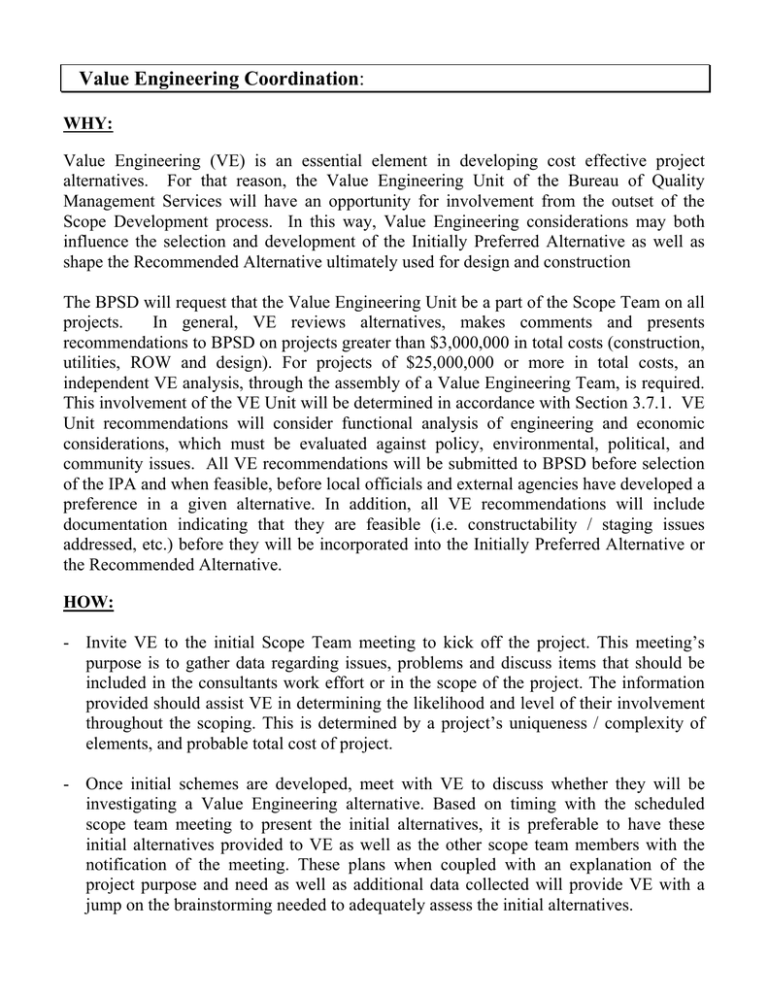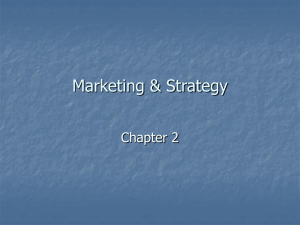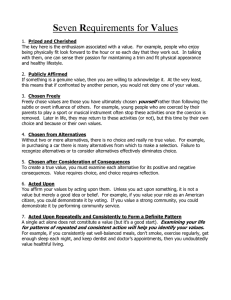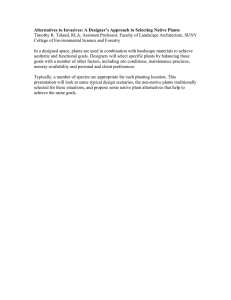Value Engineering Coordination
advertisement

Value Engineering Coordination: WHY: Value Engineering (VE) is an essential element in developing cost effective project alternatives. For that reason, the Value Engineering Unit of the Bureau of Quality Management Services will have an opportunity for involvement from the outset of the Scope Development process. In this way, Value Engineering considerations may both influence the selection and development of the Initially Preferred Alternative as well as shape the Recommended Alternative ultimately used for design and construction The BPSD will request that the Value Engineering Unit be a part of the Scope Team on all projects. In general, VE reviews alternatives, makes comments and presents recommendations to BPSD on projects greater than $3,000,000 in total costs (construction, utilities, ROW and design). For projects of $25,000,000 or more in total costs, an independent VE analysis, through the assembly of a Value Engineering Team, is required. This involvement of the VE Unit will be determined in accordance with Section 3.7.1. VE Unit recommendations will consider functional analysis of engineering and economic considerations, which must be evaluated against policy, environmental, political, and community issues. All VE recommendations will be submitted to BPSD before selection of the IPA and when feasible, before local officials and external agencies have developed a preference in a given alternative. In addition, all VE recommendations will include documentation indicating that they are feasible (i.e. constructability / staging issues addressed, etc.) before they will be incorporated into the Initially Preferred Alternative or the Recommended Alternative. HOW: - Invite VE to the initial Scope Team meeting to kick off the project. This meeting’s purpose is to gather data regarding issues, problems and discuss items that should be included in the consultants work effort or in the scope of the project. The information provided should assist VE in determining the likelihood and level of their involvement throughout the scoping. This is determined by a project’s uniqueness / complexity of elements, and probable total cost of project. - Once initial schemes are developed, meet with VE to discuss whether they will be investigating a Value Engineering alternative. Based on timing with the scheduled scope team meeting to present the initial alternatives, it is preferable to have these initial alternatives provided to VE as well as the other scope team members with the notification of the meeting. These plans when coupled with an explanation of the project purpose and need as well as additional data collected will provide VE with a jump on the brainstorming needed to adequately assess the initial alternatives. - At the end of the Internal / FHWA scope team meeting that the initial plans were presented, direction will have been provided as to which alternatives will be advanced for further study. In the time between this meeting and the next Internal / FHWA scope team meeting which will review and discuss the revised alternatives Value Engineering will examine the alternatives, make recommendations, revise and possibly develop a new alternative. In that time period, VE will have met with BPSD to discuss their recommendations, and if appropriate, BPSD will have the BPSD Task Order Consultant refine the VE alternative to assess its viability and present it to the scope team. The Goal is for VE to examine the alternatives and make recommendations within an agreed upon time frame while providing BPSD time to assess the recommendations, provide for consultant layout of a possible VE alternative and reach collective ownership of the recommendations prior to the follow up scope team meeting. It is of the utmost importance that the communities / local officials do not reach agreement with NJDOT on an alternative that requires a Value Engineering review as outlined by FHWA prior to the review being done. - At the follow-up scope team meeting held to discuss the revised alternatives, the VE alternative will be presented at which time a decision can be made as to whether further engineering is required on the various alternatives, eliminate alternatives that are unacceptable to the team, and recommend showing selected alternatives to the community that are acceptable to NJDOT. - If circumstances call for a redesign of the alternatives after VE review / buy-in, it may be appropriate to have VE examine the new alternatives. Once the IPA has been selected, the Feasibility Assessment Report will document the coordination with VE. - On projects requiring VE evaluations, BPSD should talk with VE staff to establish a time frame for these reviews. On more complex projects, even those below $25,000,000, VE may require additional time between “Development of Initial Schemes – Hold Internal / FHWA Core Group Meeting” and “Refine Initial Schemes – Follow-up Core Group Meeting”. VE should perform the review and all schemes should be revised as necessary prior to the follow-p Core Group meeting and prior to showing NJDOT recommended alternatives to the community for their buy-in. - For projects in excess of $25,000,000 total cost an independent VE Team will be called upon to evaluate the project. VE would prefer to draw upon the resources of the scope team members after they have been briefed at the “Initial Schemes – Hold Internal / FHWA Core Group Meeting”. Close coordination with VE staff is necessary to provide the essential scoping data to the team (see next paragraph), the timing of the scoping meeting and the availability of the VE team. Such projects will require time for a multidisciplinary team assessment, the follow-up evaluation by the VE staff, a meeting with BPSD to discuss findings and reach agreement between BPSD and VE, and layout / analysis by BPSD consultant for scope team presentation if appropriate. It can be anticipated that 12 weeks may be required from beginning the independent VE Team review to presentation of the VE recommendations to BPSD. Additional time may be required for consultant assessment / layout prior to the “Refine Initial Schemes – Follow-up Core Group Meeting”. - With regard to data required by the VE team, it is best to advise the VE staff of what BPSD has available or could be obtained. The quality of their review is dependent upon the completeness of the information made available. In general the information needed includes construction cost estimates, traffic volumes - present / future and existing / proposed, accident / deficiencies listed, discussion of problem and its origin, plans of all alternatives with a discussion of their reason for selection / rejection.




